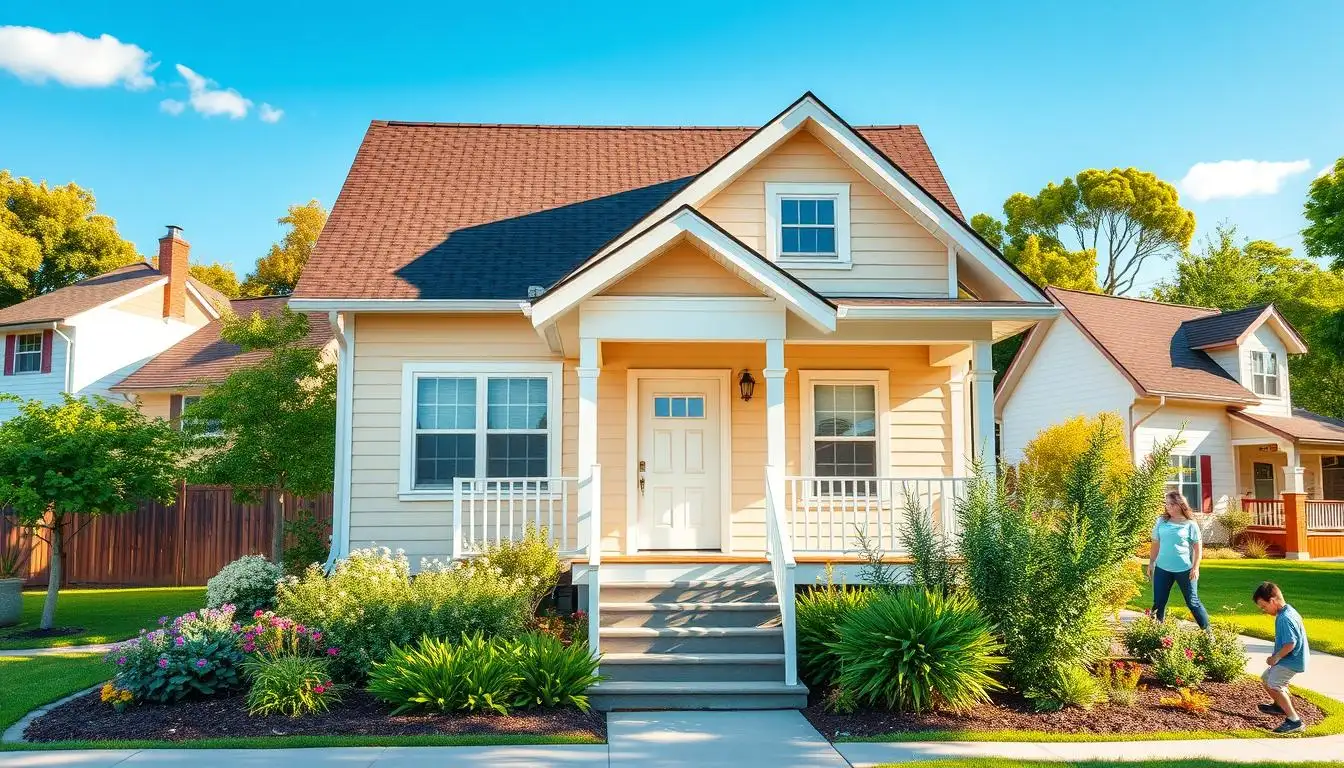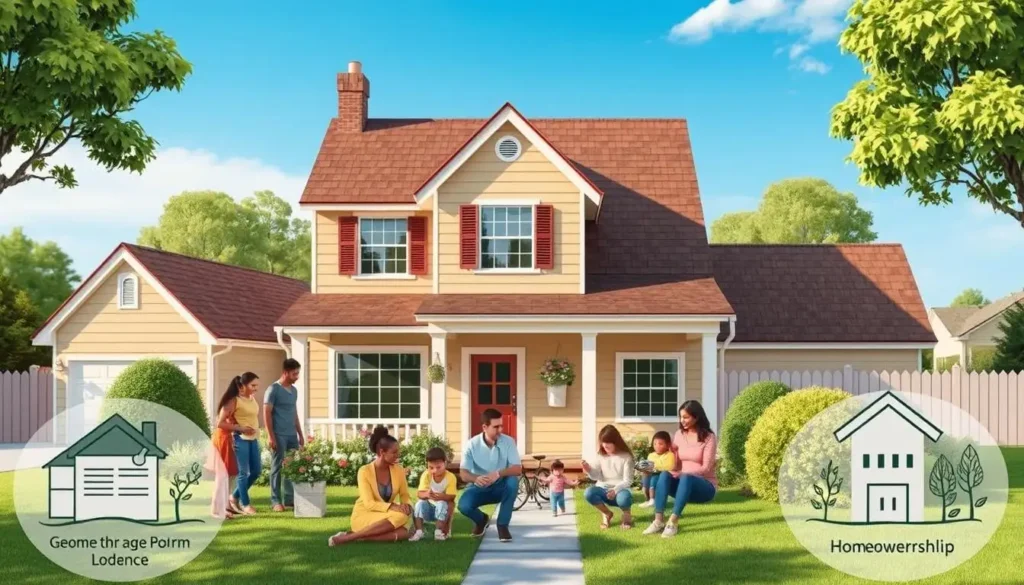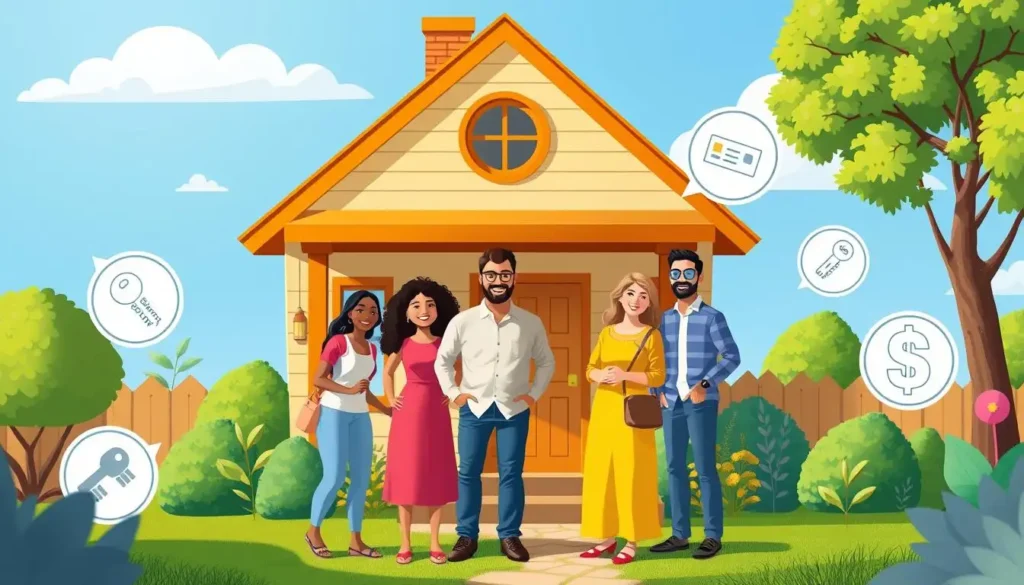Physical Address
304 North Cardinal St.
Dorchester Center, MA 02124
Physical Address
304 North Cardinal St.
Dorchester Center, MA 02124
Discover everything about Exploring HomeReady, Fannie Mae's flexible mortgage program offering low down payments and reduced income requirements for eligible homebuyers

The Fannie Mae HomeReady mortgage program helps low to moderate-income borrowers buy homes. It allows a down payment as low as 3%. This makes it great for first-time buyers or those with little money.
HomeReady offers more than just a low down payment. It has benefits for today’s diverse homebuyers. These benefits make it easier to own a home.
One big feature of HomeReady is how it looks at income. It counts income from family members and rental units. This helps those who might not qualify for other mortgages.
HomeReady also has lower private mortgage insurance (PMI) costs. This makes the program more affordable. Plus, it accepts credit scores as low as 620.
The HomeReady mortgage program from Fannie Mae is a special option for those who want to buy a home. It lets borrowers put down as little as 3% of the home’s price. This makes it easier for first-time buyers and those with limited financial resources to own a home.
HomeReady stands out because it allows for flexible income sources and lower mortgage insurance costs. Borrowers can count on income from rental properties and other sources. Also, HomeReady loans let you stop paying mortgage insurance when you own 20% of your home.
Fannie Mae launched the HomeReady mortgage program in December 2015. It was created to help more people own homes. With a lower down payment and flexible income sources, HomeReady makes buying a home easier for more people.
The HomeReady mortgage program, launched by Fannie Mae in 2015, helps low- and moderate-income buyers own homes. To get a HomeReady loan, your total income must not be more than 80% of the area median income (AMI) in your area. You can use Fannie Mae’s AMI Lookup Tool to find out the income limits for your location.
HomeReady loans also have other important requirements:
The program accepts various income types, like wages, self-employment, bonuses, pensions, and social security. You can buy single-family homes, condos, co-ops, and multi-unit properties up to four units. But, you must live in one of the units.
| Eligibility Criteria | Requirement |
|---|---|
| Income Limit | Up to 80% of Area Median Income (AMI) |
| Minimum Credit Score | 620 |
| Debt-to-Income Ratio | Up to 50% |
| Property Type | Single-family, condo, co-op, or multi-unit (up to 4 units) |
| Occupancy | Primary residence |

Knowing the income limits and requirements for HomeReady can help you see if you qualify. This knowledge can guide you towards a more affordable way to own a home.
Buying a home can be tough because of the down payment. But, the HomeReady mortgage program helps. It offers flexible down payment options and assistance programs to make owning a home easier.
The HomeReady program lets you use gift funds from family or friends for the down payment. This way, you can get help from your social network. It also accepts funds from grants, employer programs, and Community Seconds loans.
The Community Seconds program is special in the HomeReady mortgage. It lets you get a second mortgage from local governments or nonprofits. This second loan helps with the down payment and closing costs. It’s a low-interest or forgivable loan, perfect for those with little savings.
There are also down payment assistance grants for HomeReady borrowers. These grants come from state and local governments or housing authorities. They can cover part or all of the 3% down payment needed for a HomeReady loan. Borrowers should look into the grants available in their area to see if they qualify.
HomeReady makes buying a home easier for many people. This includes first-time buyers and those with lower incomes. With the right help, owning a home can become a reality.

| Down Payment Assistance Program | Minimum Down Payment | Eligible Borrowers |
|---|---|---|
| Conventional 97 | 3% | First-time and repeat homebuyers |
| HomeReady | 3% | Borrowers with low to moderate income |
| Home Possible | 3% | First-time and repeat homebuyers |
| FHA Loan | 3.5% | First-time and repeat homebuyers |
| VA Loan | 0% | Military members and veterans |
| USDA Home Loan | 0% | Borrowers in rural areas |
The HomeReady mortgage program is great for first-time homebuyers. It requires only a 3% to 5% down payment. This makes it easier for those with little savings to buy a home.
HomeReady also lets borrowers use gift funds for the down payment. This adds to the program’s financial flexibility.
One of the best things about HomeReady is the lower mortgage insurance costs. This can save homeowners a lot of money each month. Plus, the insurance can be canceled when the home’s value reaches 20% of the purchase price.
First-time buyers must take a HUD-approved homeownership course with HomeReady. This course teaches them important skills for being a homeowner. It helps them make informed decisions and ensures they’re ready for the responsibilities of owning a home.
HomeReady is a mortgage program from Fannie Mae. It’s for people with lower incomes. It has a low 3% down payment and lower mortgage insurance costs.
It also lets you count rental income when applying for a loan.
HomeReady is a conventional loan with a 3% down payment. It accepts income from rental properties and non-occupant co-borrowers. You can also cancel mortgage insurance when you reach 20% equity.
Fannie Mae started HomeReady in December 2015. It helps low-income people get mortgages. The program has a low down payment and accepts various income sources.
Borrowers must also take a homeownership education course.
HomeReady is for those who make less than 80% of their area’s median income. You need a credit score of at least 620 and a debt-to-income ratio under 50%.
The property must be your primary home.
HomeReady requires a 3% down payment. This can come from gifts, the Community Seconds program, or down payment grants. Fannie Mae also gives a $2,500 credit to those with incomes at 50% or less of their area’s median income.
HomeReady is great for first-time buyers. It has a low 3% down payment and lower mortgage insurance costs. You can cancel mortgage insurance when you have 20% equity.
It also accepts different income sources and has lower credit score requirements. This makes it easier to qualify.